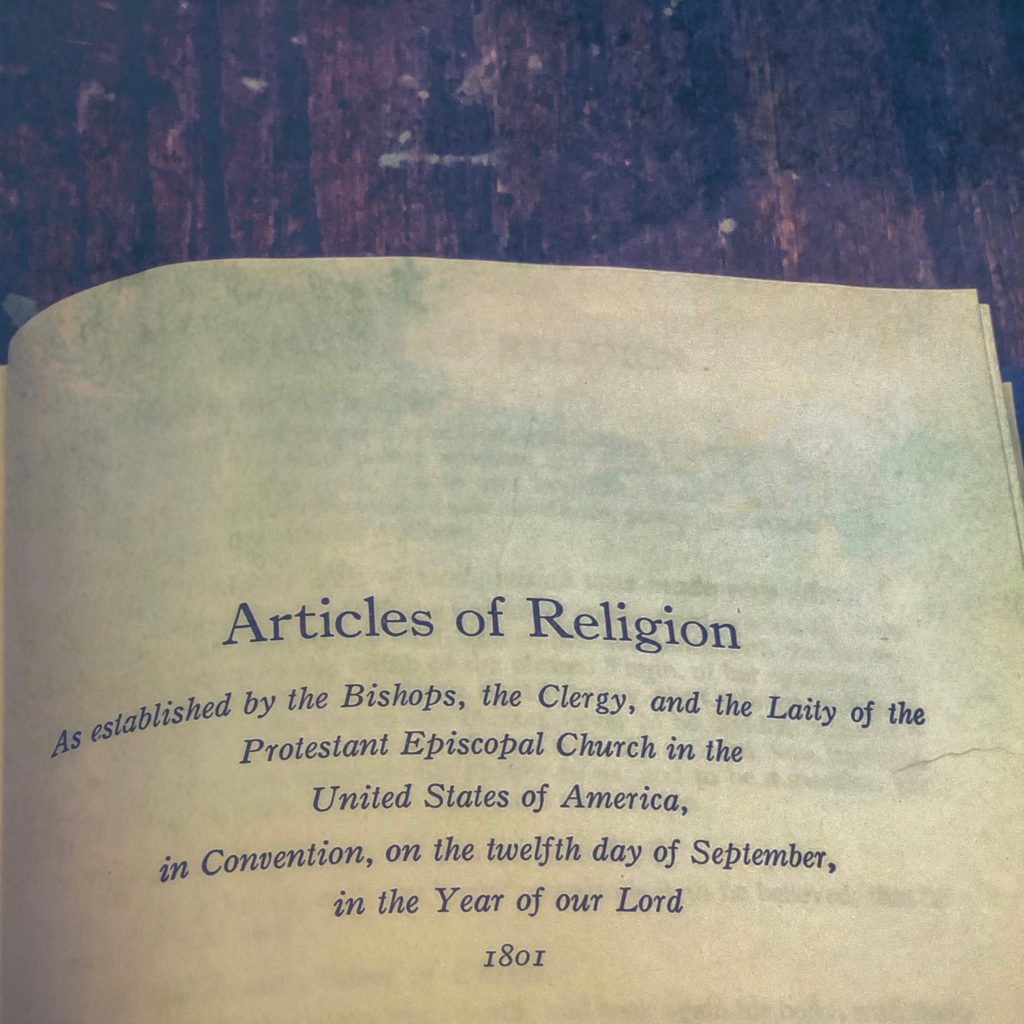
The Riches and Goods of Christians are not common, as touching the right, title, and possession of the same; as certain Anabaptists do falsely boast. Notwithstanding, every man ought, of such things as he possesseth, liberally to give alms to the poor, according to his ability.
by Josh Davis
Many make the mistake of assuming that Article 38 is primarily concerned with opposing Anabaptist theology and practice. This is an understandable conclusion, since Anabaptists are mentioned. But the role of Anabaptism in the article is intended more to be prejudicial to the more fundamental matter in question, which is land and the private property rights to its use. Article 38 appears in both Cranmer’s Forty-Two Articles (1552), written under Edward VI, and Matthew Parker’s Thirty-Nine Articles (1563), written under Elizabeth, and the wording is identical. Consequently, whether leaning toward Calvinism with Cranmer or comprehensiveness under Elizabeth, the Church’s support for these class privileges was incontestable. As R. H. Tawney wrote of the sixteenth-century England and the Tudors specifically:
The age is a commercial one in the sense that much attention is given by Governments from the reign of Henry VII. onwards to fostering the conditions which promote trade and industry.…no one who looks at the Statutes, or the Acts of the Privy Council, or the Domestic State Papers for the reigns of Henry VII., Henry VIII., and Elizabeth, can fail to realise that much of the time of Governments is occupied with devising measures which are intended to hasten industrial and commercial development. There is a settled habit of mind with regard to these matters which is quite conscious of its ends, though its means may often be ill-chosen. Every one is agreed that the encouragement of trade is the duty of the Prince.[1]
Though most readers of Thirty-Nine Articles will be more familiar with the theological and historical controversies that informed them, the importance of Article 38 cannot be appreciated apart from an awareness of English economic history. Ancient laws and customs of common property were a cornerstone of English agrarian social relations prior to the sixteenth century, and these laws began to be overturned in the sixteenth century by the rising merchant classes, devastating rural villages and revolutionizing the English economy and ultimately all of Europe’s as well. Article Thirty-Eight is most remarkable for the unequivocal stand it takes in favor of private property over against traditional land use rights, and for deploying ecclesial authority to associate those rights with heresy, religious innovation, and aberrant “enthusiasm.” [2]
What is it that is being presented as a religious aberration? It was rare for Anabaptist groups to prohibit personal ownership. Most groups maintained a “kitchen-sack” from which members’ needs were secured out of the surplus of the personal goods of other members.[3] Since the article upholds the centrality of giving “liberally” to the poor according to one’s ability, it’s the practice of holding communal rights to the use of personal property when needed that is denounced.
Historians characterize these transformations in English agriculture as revolutionary, a wholesale and “complete transformation of the most basic human relations and practices, a rupture in age-old patterns of human interaction with nature.”[4] For centuries, agrarian peasants in England relied on legal regulations of land rights and use that sustained their villages, preserved the land, ensured agricultural produce was equitably distributed, and that the community’s most vulnerable members were cared for. As Wood writes, “[i]n England, there were many such practices and customs. There existed common lands, on which members of the community might have grazing rights or the right to collect firewood, and there were various other kinds of use rights on private land, such as the right to collect the leavings of the harvest during specified periods of the year.”[5]
By the sixteenth century, though, England’s economy had developed some strikingly unique ways, compared to its European contemporaries. The English monarchy was much more centralized than European states like France. England did not have a fragmented legal, military, and aristocratic powers, all of whom insisted on autonomy and privileges distinct from the crown. These different powers derived their privileges from the monarch, and that power was concentrated in the control of land. In France, for example, landed aristocrats had military and legal power at their disposal, which they used to coerce rents from the serfs who farmed their lands. Because this was not the case in England, the English aristocracy were inordinately dependent on the efficiency and productivity of its farming tenants. It relied on innovative, nonmilitary means of coercion to compel tenants to improve their lands.
The most effective and sustainable way to do so was by establishing a bidding market for access to productive land. Since advantage in these markets was given to the most productive tenants, the agrarian communal life itself was fractured as members competed for access to land. As more productive farmers were given yet more land access, inefficient and unproductive tenants were turned into beggars and vagabonds. This competition led to new farming techniques and technologies and led to a completely unique for of social relations in England, based on these new labor and land markets. In fact, everything, even social reproduction, became dependent on markets. Social life was compelled by “imperatives of competition, accumulation, and profit-maximization, and hence a constant systemic need to develop the productive forces.”[6]
In order for lands to be improved in these ways, the customs that agricultural production had to be eliminated. And the most effective way of doing this was through land enclosures. An enclosure of communal property was “not simply a physical fencing of land but the extinction of common and customary use rights on which many people depended for their livelihood.”[7] The first important enclosures occurred throughout the sixteenth century, as landed aristocrats drove tenants from their lands, which in most instances became sheep farms. The sheep on these farms were raised as commodities, that is, not for the use value of their meat and wool, but specifically to produce wool for textile markets. Not only were enclosures vitiating ancient rights as common lands were privatized, but agricultural products and animals themselves were valued for what they could be exchanged for, not as useful in themselves.
It is vital to recognize that enclosures were not simply removing fallow lands from possible cultivation, but these acts destroyed people’s homes and caused a massive increase in homelessness and poverty. Enclosures were the way that landed aristocrats dispossessed their tenants, eliminating their direct access to productive land, and forced them into a competitive labor market where they had to accept a wage for their labor. The numbers of agricultural workers grew because of enclosures, but none of these workers possessed what they needed to reproduce themselves. Where the social relationship between lord and tenant had previously been an objective, transparent form of domination, it was now hidden beneath the impersonal demands of the market, or what Marx so skillfully described as “a material relation between people and a social relation between things.”[8]
The transformation of the whole social order, based on these labor markets, happened in sudden, destructive, and radical ways throughout the sixteenth century. Riots protesting enclosures were common during the sixteenth century, and protests continued into the seventeenth, but by the time of the Glorious Revolution in 1688, the rights of the landholding classes had been consolidated that the defense of common land rights was virtually eliminated.[9]
Given the important role that the Thirty-Nine Articles played in the English Reformation and in establishing the ethos of the Church of England, one must not underestimate the place of Article 38 in supporting this upheaval in English social relations or in the support it lent to sustaining private property, wage labor, and market competition in the centuries that followed. It is not just that Article 38 sullies the traditions that preserved English agricultural life up to the sixteenth century by associating arguments in their favor with Anabaptism and heresy, but it promotes a social vision and understanding or property that was radically innovative in its time but which is taken for granted by us today. Indeed, so much is this the case that it can be difficult even to see that private property is not intrinsic to human nature.
Regardless of what conclusions one draws about the ethical obligations Christians have with respect to common property, there can be no plausible justification for private property as it here defended by Article 38, “as touching the right, title, and possession” of “[t]he riches and goods of Christians.” When defended according to these terms, it is impossible to uphold Paul’s definition of the Christian community as the Body of Christ. As Hegel so poignantly noted, the claim that private property is a universal, rational imperative for humans, as Kant did, is riven by contradictions. After all, property is only private when it is not universal. The significance of private property right is that it grants the privilege of excepting something from the common whole. But the exception cannot also be the rule; the relative cannot be absolute, the conditioned cannot be unconditioned, the contingent cannot be necessary. And thus, Hegel concludes, while it may appear on its face that violating the sanctity of private property is immoral, in fact, what is truly immoral is the attempt to universalize the obligation not to violate private property.[10] Doing so violates the proper order, attempts to derive the universal and absolute from the relative and contingent, rather than vice versa.
Put in more concrete terms, if we follow the directive of Article 38 that “riches and goods of Christians are not common, as touching the right, title, and possession of the same,” then we can no longer speak of the role that a Christian, as a member of the Body of Christ, plays in that Body—“The eye cannot say to the hand, “I have no need of you,” nor again the head to the feet, “I have no need of you”; “Now you are the body of Christ and individually members of it” (1 Cor. 12:21; 27)—but must instead attempt to make the extraordinary claim that what binds Christians together as members of Christ is that we are all exceptions to him. Ensnared by this contradiction, political, economic, ecclesial, and theological reasoning is deformed. It becomes, simply, irrational and ideological. The issue here is not simply an error in thought or reason (theological or otherwise), but a malfunction of social life. The universal demand to honor private property rights is not only fundamentally irrational and ideological, but the destruction of the very possibility of the common good.
But the most salient and vital point to make here is that Article 38 is, albeit unwittingly, idolatrous. It elevates a relative part of the world to the absolute. The social world of private property distorts our understanding of the natural world, and forges with its hands a god to preside over this disordered world, always bearing done on us, compelling our devotion and sacrifices: Capitalism.
Josh Davis is the Dean of the Alabama Integrative Ministry School (AIMS). He has previously taught at the General Theological Seminary. Most recently, he is the editor of Misrecognitions: Gillian Rose and the Task of Political Theology. He is also the co-editor with Douglas Harink of Apocalyptic and the Future of Theology.
[1] R. H. Tawney. “The Agrarian Problem in the Sixteenth Century,” 177ff.
[2] Karl Polanyi, The Great Transformation, 37.
[3] Karl Kautsky, Communism in Central Europe in the Time of the Reformation, 163–65.
[4] Ellen Meiksins Wood, The Origin of Capitalism, 95.
[5] Wood, The Origin of Capitalism, 107.
[6] Ibid., 97.
[7] Wood, The Origin of Capitalism, 108.
[8] Karl Marx, Capital, ch 1
[9] Wood, The Origin of Capitalism, 108.
[10] Hegel, Natural Law, 77ff.
